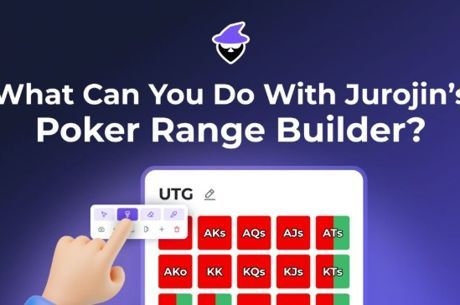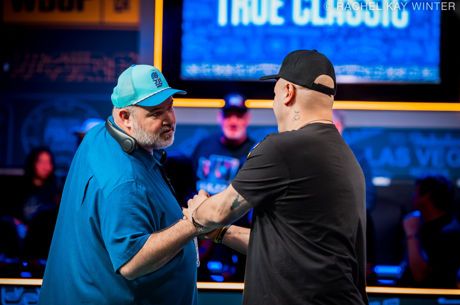H.O.R.S.E. Poker Strategy: In the Mix -- Getting the Most Out of Omaha Hi/Lo

Most beginning mixed-games players tend to play conservatively in the stud games, play somewhat decently in limit hold'em (due to its overlap with the game of choice for the past four years, no-limit hold'em), but become absolutely spew-y in limit Omaha hi/lo. A few weeks ago I wrote about one of the ways to combat this tendency. Players should try to look at a starting hand as a series of coordinate two-card units. That is, Omaha requires a winning hand to use exactly two cards from the player's hand, but the player should think about how each of the two-card units in his starting hand works with the other cards in his hand after the flop to make a four-card hand. The idea is to avoid playing hands with one or more "danglers" — cards that do not work in any way with the other cards in the starting hand.
The flip side of trying not to "throw good money after bad" (or even putting bad money in the pot to begin with) is trying to maximize the amount of money in the pot when a player has the best of it. Two easy ways this can be accomplished are by playing to scoop the whole pot and by betting cooperatively when scooping isn't possible.
Playing to scoop the whole pot is a concept I've touched upon previously, in the context of the discussion of being quartered. The idea is that by playing a hand which can only win half the pot, a player is never going to win very much money in split-pot games. Consider the difference: if three players put in two small bets each before the flop, one small bet each on the flop, two big bets each on the turn and one big bet each on the river, the pot contains a total of 13.5 big bets, with each player having contributed 4.5 of those bets. A player who scoops makes a profit of nine big bets, a very nice return on his 4.5-bet investment. A player who chops for half the pot receives 6.75 big bets, a much more modest profit of only 2.25 big bets.
There are a few basic ways a player can try to play to scoop in order to maximize the amount of money he wins. First, since Omaha hi/lo is a split-pot game, the easiest way to try to scoop is by playing strong two-way hands. A hand like A♥2♥3♣K♣ has two strong flush possibilities, several straight possibilities and some high-card value for high while also having three excellent low cards that can make the nut low and contain some counterfeit protection. Compare that hand with a hand like A♥2♣3♠7♠, which will generally scoop only in those instances where it makes a wheel.
Another method of attempting to scoop is playing hands for their ability to make a high hand. Too often players will play a hand like A♥2♣3♠7♠ because they know that it's a good starting low hand. The problem is that they will almost never scoop with it, because there is always a high hand in Omaha hi/lo. The same can't be set of low hands; there will only potentially be a low hand if three cards of unique ranks eight or lower come on board. What this means is that approximately 40% of the time, no low will be possible. The player with the winning high hand will thus scoop the whole pot. Therefore, playing four high cards — a hand like A♥K♣K♥Q♣ — will scoop more often than playing four low cards.
It's not always possible to scoop, though. A possible low will hit the board roughly 60% of the time, and there's simply no way of winning it every time it does hit. However, there are still ways to maximize the amount of money that goes into the pot when a player has the best of it (and therefore comes back into the player's stack when he wins a portion of the pot). It requires some hand-reading ability and it requires some pot manipulation and a savvy opponent.
Consider a multi-way pot where it seems obvious that, based on the flop and turn betting, one player has made a strong low, a second player is drawing at a high hand like a flush or full house, and a third player has already made a high (most probably a straight, since this is often a hand that winds up second-best by the river in Omaha hi/lo). A card hits the river that would complete the high-hand draw for the second player. How should the first and second players play the river?
Too often, the first player to act will bet his made low, and the second player to act will raise, having made his high hand (for sake of argument, let's assume it's a flush, since that's the easiest high hand for even most beginners to spot on the board). The effect of this bet and raise is that it will be two big bets to the third player, the one who has the worst hand. He will often fold here, and as a result the first and second players will make no money on the river — they will each get half of the pot and as a result will get their river bets back. On the other hand, if the first player would simply check and let the second player lead out with his made high hand, there's a much better chance the third player would call one bet with his now-second-best straight. The first player in the hand then can decide whether to simply call behind or attempt to put in a raise and squeeze another bet or two out of the third player. The point is, that by acting cooperatively (in a perfectly legitimate manner) with the second player, the first player has given himself the best chance to squeeze out an extra bet or two on the river from the player with the worst hand. Over time, those extra bets and half-bets add up.
This last strategy is a difficult one to master; it requires an excellent ability to read hands and to know who's going which way (high or low) in order to set up the river bets properly. Because of the fact that sometimes people can be going for both halves of the pot, as they should if they want to maximize their Omaha earnings, it can be hard to determine what to do when the river comes. Even players themselves who think they have the high half of the pot locked up find themselves getting the low half with a very weak low hand if no other player shows a qualifying low hand. This is jokingly referred to as an "emergency low" due to the fact that without it, they'd get nothing.
Trying to scoop the pot and squeezing those extra bets out on the river will go a long way towards improving a player's results in the Omaha round of mixed games.









